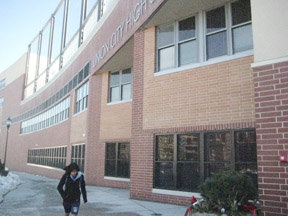The 11,600-student Union City School District receives 75 percent of its funding from the state, but now it may have to find new sources, dip into its surplus, or cut spending.
After new Gov. Chris Christie announced a “fiscal emergency” in the state of New Jersey two weeks ago, he pledged to cut $475 million in funding for schools statewide, as well as funding for hospitals and colleges – and those cuts only pertain to the current state budget that ends this June 30. Next year’s budget may be worse.
Christie is expected to give his budget to the state legislature for next year on March 16. Schools who were expecting the funds will have to use surplus funds for the rest of the year, Christie said.
Schools who were expecting the funds will have to use surplus funds for the rest of the year, Christie said.
________
West New York will not see any of its aid cut this year.
Union City’s budget was $230 million this year, meaning Christie’s cuts represent approximately 13 percent of the total budget.
However, Superintendent of Schools Stanley Sanger said the district will probably get through this year without any major changes, since the amount cut is equal to the amount of the district’s surplus funds.
Yet he said that it is not fair for the district to be penalized because of fiscal prudence in saving these emergency funds.
“Yes, we did have a surplus,” he said. “That was sound fiscal management. Unfortunately, now the governor chose to take away these funds.”
He said that the district has made great strides, particularly in standardized test scores, and he hopes not to stop the progress.
“We’re very proud in Union City that we have, these past seven years, met the intent of the state Supreme Court rulings for Abbott Districts in New Jersey,” Sanger said, referring to a series of court decisions in the 1970s and 1980s that forced the state to fund urban districts so that they provide an equal education to suburban districts. “Our test scores are as high as in suburban districts. We’ve proven that the urban child, when given the opportunity and resources, can be on par with suburban districts. We hope those cuts won’t diminish those opportunities and resources.”
Next year
He said that after finding out about the cuts only two weeks ago, the administration has tried to start thinking of how to cope if funding stays flat next year. He said they hope to maintain their level of success no matter what.
The district closed its two high schools last year and opened its newly built $136 million Union City High School this past September, with the construction funds coming from a multiyear School Construction Corporation program funded by the state. (The program was changed in 2008 due to fiscal mismanagement.) Besides the high school, the district runs nine elementary schools, two middle schools, a freshman academy, and early childhood programs.
Sanger said that since the district was reconfigured this year, with the former high school buildings becoming middle schools, they made sure to hang on to the surplus to use in serving the district’s changing needs.
He said that even if changes have to be made for next year, they will do their best to maintain the level of success they have had. He said the district was one of the top three urban districts in terms of standardized test scores.
Trying to reduce the damage
On Wednesday, Mark Albiez, a spokesman for Union City Mayor and State Sen. Brian Stack, said that Stack was in Trenton trying to get the cuts reduced.
Albiez said that the cuts were only for this year, and he is unsure what will happen next year.
“I think that the impact will be significant” if the cuts remain in place, Albiez said.
Almost two years ago, state lawmakers questioned some spending in the Union City district after a troubling audit was released of the three prior years. The audit by PMK accountants revealed information such as: $73,125 a person in overtime earnings by bus drivers (more than double the amount of their base pay), bus drivers earning up to six hours of overtime for charging their cell phones, $26,000 in monthly payments for the district’s school website, and a $2,268 tab at the Sheraton Edison Hotel for students and two teachers for which that audit report claims “no agenda was found.”
At the time, Sanger said that those issues would be dealt with in the future, particularly related to the cell phone use.
Funding always a struggle
Since the 1970s, New Jersey has struggled with the issue of how to make the education in urban districts comparable with that of wealthy districts. A series of State Supreme Court decisions in the Abbott vs. Burke case said that there should be some parity among the districts. But the state was not sure how to award extra funds to the 31 poorest districts to make that happen.
Special “Abbott” funding has been given to the 31 poorest districts for approximately 10 years, including Hoboken, Jersey City, Union City, and West New York. The Schools Construction Corporation also arose out of that mandate, funding construction projects in the urban districts, some of which were later stalled.
In 2008, then-Gov. Jon Corzine passed the School Funding Reform Act of 2008, revising the aid formula so that it would be based on the economics of the kids attending the public schools, rather than just the socioeconomic category of people living in the town. Some districts lost aid, while others gained it. Union City received a slight increase.
